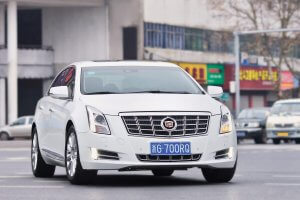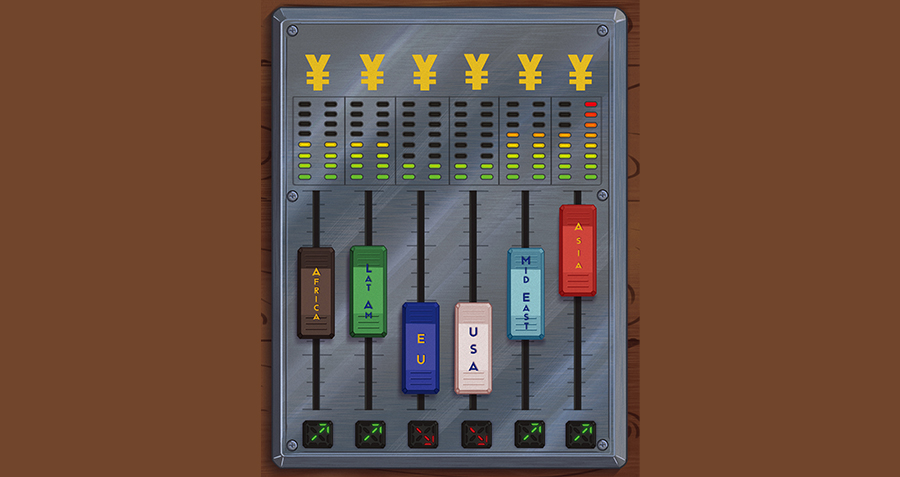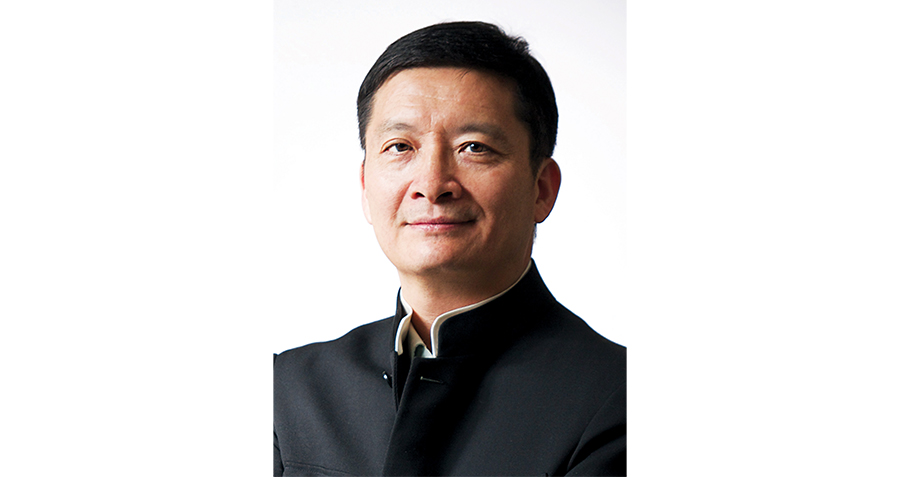Craig Allen, President of the US-China Business Council, looks at the impact on businesses of deteriorating relations between the world’s two largest economies
With the coronavirus disrupting trade international trade, what will become of the China-US “Phase One” trade deal, the first set of negotiations in the two countries’ protracted trade war, and when will “Phase Two” begin? Craig Allen highlights how problems related to state-owned enterprises, subsidies and technology policies are still issues for foreign companies operating in China.
In 2018, Craig Allen began his tenure in Washington DC, as the sixth President of the United States-China Business Council (USCBC), a private non-profit organization representing over 200 American companies doing business with China.
Before joining USCBC, Allen had a long, distinguished career in US public service. He was US ambassador to Brunei and served as the Deputy Assistant Secretary for Asia at the US Department of Commerce’s International Trade Administration and as Minister Counselor at the US Embassy in Beijing.
In this interview, Allen looks at the role state-owned enterprises (SOEs) play in China, the “Phase One” trade deal and just how far China and the US can “decouple” from one another.
The last two years has seen a gradual process that many people call “decoupling.” How would you view the China-US trade relationship in this context?
The China-US relationship is characterized by increasing competition and decreasing cooperation across many fields.
On one hand, you have tariffs and then counter tariffs, which have led to quite a dramatic reduction in trade. Even though both economies have been growing in a healthy way, China’s exports to the US in 2019 were down 20% as were US exports to China. So that would be the first form of decoupling.
The second manifestation of decoupling would lie in technology. In both countries, there is an increasing concern of over-dependence on the technology of the other side. Both governments are engaged in restrictions that will lead to greater self-reliance in technology.
I wouldn’t take the context of decoupling too far, however, as the two economies are very much intertwined, interdependent, synergistic and compatible, so I believe that decoupling in the form of tariffs is temporary. The decoupling found in the field of technology is more worrying, with the effects of that likely being longer term.
Both are a concern, as both limit economic prosperity on both sides and they create tension that is perhaps unnecessary.
What technologies are at risk of decoupling and to what degree do you believe decoupling will come to pass?
When turning to technology, problems are deeper, more difficult and longer term. I believe that a complete decoupling is not possible, but as an example, China’s internet is already decoupled from the rest of the world and the US telecommunications system is decoupling from one particular Chinese company.
We read that on the Chinese side that the government would like to remove all foreign computers and software from government institutions in the next two to three years. On the US side, we see new controls on emerging technologies and foundational technologies. We need to be honest and say that we don’t know where this will lead. I hope that we can keep the decoupling as narrow as possible to allow the free exchange of knowledge, products, intellectual property, software and business models.
products, intellectual property, software and business models.
We want both governments to protect national security, but we believe that that means tall walls around a narrow garden, not around all new technology and research. So, let’s protect things that need to be protected and open up things that are not real national security concerns. Both governments should be careful not to use a national security excuse to engage in protectionism, and I think that both governments are currently guilty of doing that.
What role is there for organizations such as yours, chambers of commerce and other representatives of US businesses, during these changes?
We are actively speaking to both governments and encouraging negotiations, because we want solutions and not sanctions. We have real problems in the Chinese market, as we do not believe that the Chinese side has fully implemented its WTO obligations. So, we’re hopeful that both sides will talk about that.
When you look at the results of the Phase One trade deal, I would argue that all those improvements on intellectual property rights, agriculture and financial services, are merely China meeting its WTO obligations. China should have done those things earlier in any case, as they were obligated to do. We encourage market-oriented reforms that benefit our own country, but also benefit our trading partners.
Trade is not a zero-sum game where I win, and you lose. Trade is a positive-sum game, where I can win and you can win too, which is how it has been for 4,000 years. So, let’s have freer trade, welcome each other’s companies into each other’s markets and treat each other with respect and dignity.
Some people have said that the response of US businesses to the deteriorating relationship between China and the US has been remarkably muted. Why is that?
Firstly, American companies in general agree with President Trump on his diagnosis of the problems at hand and agree that the Chinese government had not adequately implemented its WTO obligations. What we don’t agree with, however, is the use of tariffs to force negotiations, as they harm both American and Chinese companies and consumers. Ultimately, we agree with the diagnosis, but we don’t agree with the method of treatment.
That’s why criticism has been muted. I believe that the voice of business has been consistent, we have supported resolution of the dispute on market-oriented, pro-trade and pro-investment terms. We want to support both governments, but we also want to support the WTO and the international obligations written in international law that we all survive by.
How do you see the US-China Business Council’s role developing in light of the changing relationship between China and the US? Are there any opportunities that you see coming out of this?
We very much want to support and assist both governments to implement the Phase One agreement. The Phase One agreement is complex and there are two major elements of it, but let us be honest and say that it is companies and workers that must implement this agreement and not governments directly.
Secondly, there’s a Phase Two of the agreement that will need to address problems related to state-owned enterprises, subsidies and technology policies. We can make incremental progress on all those issues. We may not be able to go from A to Z immediately, but we can go from A to B, then on to C and then D. We want to keep up the momentum gathered from Phase One so that we have continued market opening and reform in China and adherence to WTO obligations by both countries. So, we will be working very intimately with both governments to support them in ensuring a successful Phase One and then move on to a fruitful Phase Two as quickly as possible.
How do you view the status of China’s economy now and how does it impact on the prospects of US companies operating in China?
I have such respect for the Chinese economic leadership, from Premier Li Keqiang to the Central Bank Governor and the Minister of Commerce, as well as all the economists and economic experts involved in China’s economic decision-making. They are an absolute dream team.
The Chinese economy today is growing smartly and on a much bigger base, and the quality of growth is good. What I mean is that the labor share of the economy—the percentage of the economy going to the worker in terms of wages—is growing faster probably than in any other country in the world, so domestic private consumption is growing rapidly. We want that to continue and for China’s middle-class consumers to feel secure in using their new credit cards. I’m confident about the Chinese economy, notwithstanding some challenges, but I am bullish and expect continued growth.
Because of the healthy Chinese economy, American companies are interested in expanding their exports into China. All the companies in my trade association want to invest more in China and expand in China, because China’s producing approximately 30% of global economic growth today. That’s more growth than in Europe, Japan and the US combined, so naturally businesses want to have a growing presence in China.
What do you foresee as the biggest potential problems within the Chinese economy going forward?
The overall debt of China is very high, and that will lead to defaults, particularly in second, third and fourth-tier cities that have become over indebted. Along with the debt, there are problems with overcapacity in various industries. To wind that down will be extremely painful and difficult, but it must be done—there is no other way forward.
Local government finance has also been a mess for a long time, with debt and local government finance existing together and some cities are having more problems with that than others.
In the longer term, China’s aging society is going to become a big subject. The demographic challenges that China faces are severe and there is no way to avoid them, one can only manage them. The demographics of China and the US are quite different. Ten years from now, China will be in a difficult spot, and in 20 years from now, China’s demographic situation will become even worse. Whereas the US will likely be much healthier in this regard because we are an immigrant society.
There has been a lot of talk about loosening regulations on foreign investments in China. What kind of an impact will this have on the levels of interest among US companies looking to invest in China?
We look at the foreign investment law and the Phase One trade deal, both of which we are very happy with. The adjustments made in Chinese law are good, but at the same time the Chinese government needs to issue licenses. If they just change the law without issuing any licenses, then that’s a problem.
The other major problem, which is a difficult issue for the Chinese government, is the role of state-owned enterprises (SOEs). Will foreign companies be allowed to compete fairly against SOEs? Will Chinese private sector companies be allowed to compete more fairly with SOEs? Part of the answers to these questions revolves around what will happen with SOE reform. Will there be real reform? Right now, SOEs in China control around 30% of the Chinese economy, but they get 80% of bank loans. There’s clearly a strong preference for SOEs and you cannot support SOEs and private enterprises at the same time. That remains a fundamental problem that the Chinese government is grappling with.
Foreign-invested enterprises will invest big time in China if they can compete fairly against SOEs, but right now we’re not so certain about that.
What impact has the shift in the China-US relationship had on countries in Southeast Asia? And what is the position of the Business Council on this?
There have been some beneficiaries and there have been some people who have lost out. I see increased investment by American and Chinese companies in Malaysia, Thailand and Vietnam. South Korea is perhaps both winning and losing.
Hong Kong, however, is an interesting case. I feel that the deteriorating China-US relationship has made it even more difficult to resolve already existing problems. Part of the economic stress in Hong Kong is a result of the tariffs, and the slowdown in trade between China and the US has had a disproportionate impact on Hong Kong.
The Business Council wants stability and right now we have anything but stability. An example is seen in the auto industry regarding tariffs. Are they on or are they off? How can you do business when you ship a product by sea, and you don’t know what the tariff will be when it arrives? But I’m afraid that that is where we are. Automotive tariffs over the last year have made my head spin. We are happy to follow Chinese law in China and American law in the US, but we need to know what the laws are.
From a philosophical perspective, I think it’s appropriate and fair to say that the role of government is to bring stability and rule of law to the marketplace, so that business people can make investment decisions and run a business in a stable and predictable environment. But in an environment where it’s so unstable, there are business people who are suffering. The trade distortion that has been created by this instability in trade is regrettable and detracts value from the global economy.
With the Business Council located in Washington DC, we imagine that you have a better sense of what is felt on the ground. The policies of the Trump administration on China are clearly hugely different to the administrations that came before it. Why have policies on China changed now and what is your view on this change?
The election of Donald Trump in 2016 was a populist reaction against globalization, international institutions and the international elite. When looking at it from that angle, it becomes more understandable as to why policies toward China changed so dramatically.
If I were to put this in a positive context, President Trump is trying to support American factories, workers and farmers. He believes that because China has not fully implemented its WTO obligations, American companies and workers have been victims. He wants to bring manufacturing back to the US to the benefit of Americans. If you look at it from his perspective, he is doing everything that he can to support American working men and women, and that’s why they support him.
Whether he is achieving his desired results is a different issue entirely. But politically, he is trying to recreate an American manufacturing base and his simple slogan “Make America Great Again,” describes his approach accurately. Many people don’t agree with that and even for many of our friends, allies and partners around the world, this is an uncomfortable thing.
From his supporters’ viewpoint, the international elite have not been good for America’s economy, the lives of ordinary Americans and America’s place in the world, so he is reacting to that. I’m not suggesting that that’s the whole story, but I think it’s important that our Chinese friends and your readers understand it from his point of view. You don’t have to agree, but you should understand why he is doing what he is doing.
If you look at this empirically, the data would be mixed on whether he has achieved anything in the direction of his goal. On the one hand, the manufacturing industry in the US has had about one year of decline since these policies came in place. The policies are supposed to have helped the manufacturing industry but that hasn’t happened. Agricultural exports have declined. But President Trump has told his supporters that he believes that their time of waiting is over and that there will be a large increase in exports, manufacturing and investment, so we’ll see.
Quality of life in the China of today is clearly much better than before, which suggests that there is something right to the formula that the state is using. To what extent is the much-debated state-owned enterprise system beneficial? Should the US perhaps consider it as well?
Our economies and societies are quite different. If you go back in history, China has had SOEs for a very long time. In addition to that, public ownership is enshrined in China’s constitution. We don’t have that at all in the US. We do have public enterprises, but as a percentage of our gross domestic product, they’re negligible. So, I don’t think that it’s useful to consider the Chinese SOE system as a model for the US. I think that the economics of this are pretty clear: SOEs are a drag on economic growth and reduce competition in markets where they dominate. They are also not innovative and global.
Virtually all of China’s growth and new employment is coming from the private sector. So, I’m not a fan of China’s SOE system and I think that they carry negative economic consequences. Overall, it depends on a country’s stage of economic development. To build infrastructure and provide common goods for example, I believe that SOEs are excellent. But once you reach a level of economic development, then market competition is much better. China has surpassed the stage of economic development where it needs to build more infrastructure and in the age of innovation, SOEs are a drag on the economy.

















